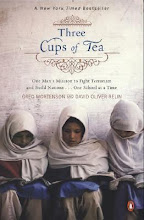I hope you're enjoying Three Cups of Tea. I also hope that you got your tickets to see Greg Mortenson at Xavier University on September 29. There are no more tickets available for that event.
Let's get the discussion started!
-There is a telling passage about Mortenson’s change of direction at the start of the book: “One evening, he went to bed by a yak dung fire a mountaineer who’d lost his way, and one morning, by the time he’d shared a pot of butter tea with his hosts and laced up his boots, he’d become a humanitarian who’d found a meaningful path to follow for the rest of his life.” What made Mortenson particularly ripe for such a transformation?
-Relin gives a “warts and all” portrait of Mortenson, showing him as a hero but also as a flawed human being with some exasperating traits. Talk about how Relin chose to write about Mortenson’s character—his choice of details, his perspective, the way he constructs scenes. Is Mortenson someone you’d like to get to know, work with, or have as a neighbor or friend?
-At the heart of the book is a powerful but simple message: we each as individuals have the power to change the world, one cup of tea at a time. Yet the book powerfully dramatizes the obstacles in the way of this philosophy: bloody wars waged by huge armies, prejudice, religious extremism, cultural barriers. What do you think of the “one cup of tea at a time” philosophy? Do you think Mortenson’s vision can work for lasting and meaningful change?
-The Balti people are fierce yet extremely hospitable, kind yet rigid, determined to better themselves yet stuck in the past. Discuss your reactions to them and the other groups that Mortenson tries to help.
-Much of the book is a meditation on what it means to be a foreigner assimilating with another culture. Discuss your own experiences with foreign cultures—things that you have learned, mistakes you have made, misunderstandings you have endured.
-Did the book change your views toward Islam or Muslims? Consider the cleric Syed Abbas who implores Americans to “look into our hearts and see that the great majority of us are not terrorists, but good and simple people.” Discuss this statement. Has the book inspired you to learn more about the region?
Friday, August 20, 2010
Subscribe to:
Post Comments (Atom)






No comments:
Post a Comment